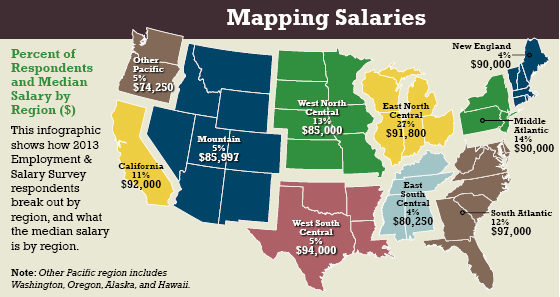Food scientist salaries back on track; more young women in the industry: IFT

That’s 3.4% higher than 2011’s $87,700 figure, which included the time frame just after the 2007-’09 recession.
Also notable for this year’s survey of nearly 4,000 US IFT members was that the ratio of women to men under age of 30 was greater for the first time in the history of the survey.
“Women comprised 65% of survey respondents, which correlates with more younger women coming into the industry,” Sharon Kneebone, IFT’s director of membership, told FoodNavigator-USA. “It’s interesting because before we got the numbers, we were noticing more young women, then we got data that validated that hypothesis.”
Responses to the wide-ranging survey suggest that although economic growth remains anemic, it’s taking less of a toll on the food science industry than it did two years ago. Indeed, 42% of respondents said that the economy has had no impact on employment within their organizations. The share of those who reported staff reductions (29%) and hiring freezes (27%) in 2013 was also down slightly from 2011’s staff reduction (30%) and hiring freeze (31%) totals. In addition, in 2013, 17% reported salary freezes vs 20% in 2011.
“There seems to be a little bit of uptick. If you’re a good employee and you’ve got a good background, I think you’ve got the upper hand right now.” Nonetheless, he said that many employers “still think we’re in a recession,” which can translate to a conservative approach to salaries.
‘2009 was terrible’; companies growing staff instead of just filling positions
Moira McGrath, president of Deerfield, FL executive search firm Opus International, which focuses on the food science field, said she’s seeing a turnaround after a period of several years in which the job market was flat. “2009 was terrible,” McGrath noted, “and in 2011, employers were filling positions. Now I see that they’re adding to staff.”
Although she said she is optimistic about future opportunities in food science, McGrath acknowledged some concerns. “I’m hearing about layoffs,” she said. “That makes me nervous.” Overall, though, “I think the industry is still very strong,” she said.
Executive recruiter and consultant Ron Bynum, President of RightSource Inc., Daytona Beach, FL., had a somewhat similar perspective. “Everybody says that we’re out of the recession,” Bynum told IFT, “but hiring has just gotten busy for us in the past three months. In the first part of the year [2013], it was still quiet.
“I think companies are starting to feel good. We’ve placed two national key accounts guys, and [filled] five or six technical positions in the last four months, and they’re all paying pretty well.”
Job satisfaction up slightly; correlates positively with salary
A total of 87% of survey respondents are either highly (39%) or somewhat (48%) satisfied with their jobs. That compares favorably with a 2012 survey of US employees conducted by the Society for Human Resource Management (SHRM) in which 81% said they’re satisfied—with 38% describing themselves as very satisfied and 43% as somewhat satisfied.
Unsurprisingly, the survey showed a strong correlation between salary and job satisfaction. The median salary among those who described themselves as highly satisfied is $111,463 vs $90,303 for those who said they were somewhat satisfied. Those who described themselves as neither satisfied nor dissatisfied reported a median salary of $79,176.
Employees’ stress levels appear to be holding constant compared to two years ago. In 2013, 47% of survey respondents rated their jobs as highly stressful/stressful compared with 48% who categorized them in that way in 2011.
Gender gap improving for entry level employees
Overall, the salary gap between male and female survey respondents remained fairly consistent with IFT’s 2011 survey in which women earned 78.4% of men’s median salary. In 2013, women—with a median of $79,000—earned 77.5% of the $102,000 median for men. Although the percentage differential was down slightly, it compares favorably with national data which show that, across industries, women earned 76.5% of men’s salaries in 2012.
Indeed, the IFT survey results suggest that the tide also may be turning for women in the entry-level salary gap, which narrowed this year. The survey shows that at $50,000, the median salary for women with 0–1 years of experience is 91% of the $55,000 for men with the same level of experience.
Master’s and culinary degrees wanted; flavorist, chemist and QA jobs hard to fill
Who’s most in demand in the food science field? “Everyone is looking for someone who has a B.S. or master’s degree, preferably with five to 15 years of industry experience, whether it be product development, quality assurance, or food safety,” said McGrath of Opus International. “That’s where the shortage is because we now have a lot of students coming out, but they’re still very new, and five to 10 years ago, we had a real shortage of students. When we have job openings, we all seem to be looking for the same person … that up and comer—that person who has experience, but who is not at the director level yet.”
Bynum described the most sought after candidate as someone who is “affordable and will probably stay around for awhile,” adding that it can be hard to persuade those who are at this point in their careers to make a move. “It’s Murphy’s Law,” said Bynum. “Some of these people are the happiest with their employers. They’ve made it through the training stage.”
Bynum said the positions he has had the most trouble filling include flavorists, flavor chemists, and quality assurance jobs.
“Food safety is still No. 1,” said McGrath. “There has to be strength in food safety these days, especially because of (Food Safety Modernization Act rules. That’s causing a lot of shortages.”
Positions with companies that make healthful and nutritious foods and beverages represent good opportunities, as the recruiters noted. Bynum observed that expertise in the culinary area is a career-booster—so much so that if someone is considering a second degree, he would probably suggest culinary training over an MBA.












